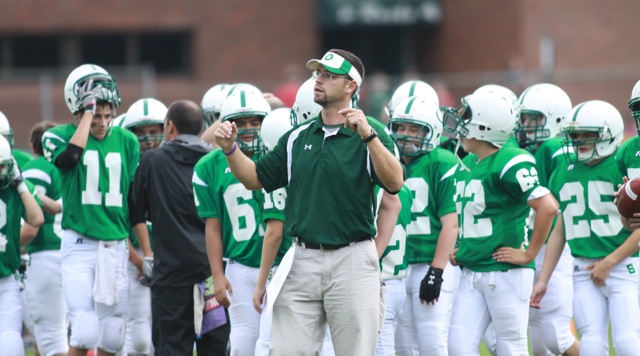H.S. Football Coaches Make Up 1 Team On ’Expedition Impossible’ Show
http://www.ocregister.com/entertainment/says-304832-biamila-gbaja.html
Oh, reality TV, you are a harsh mistress.
Gbaja-Biamila and Ricky Sharpe, both football coaches at Sage Hill School in Newport Coast, and their San Diego State University teammate Robert Ortiz make up one of 13 teams on “Expedition Impossible,” ABC’s new adventure race reality series that premieres at 9 p.m. Thursday, June 23.
In the show, trios of like-minded adventurers (our guys are the Football Players, other teams include the Cops, the California Girls, and the Fishermen) are flown to Morocco to face its scorching deserts, snow-capped mountains, raging rivers and craggy cliffs.
And that’s nothing that Gbaja-Biamila, raised a Los Angeles-raised city kid, would have ever picked for himself.
“It all really started with me being an Oprah Winfrey fan,” he says, explaining how as Oprah prepared to end her talk show and launch the OWN network she announced plans last year to stage a reality TV series to find a new talk show host.
“My wife pushed me to do it,” Gbaja-Biamila says of the auditions held around the country last summer. “So I went to the actual casting call in Laguna Niguel. I got up at 2 a.m. and went out there with 15,000 people.”
And, as he hoped and maybe even expected, he made a good impression. A communications major at SDSU and a college football broadcaster for CBS, Gbaja-Biamila is a personable guy who felt perfectly comfortable talking into a microphone. He made it to the final 20 before getting cut, shortly before that show – produced by Mark Burnett, who also created “Survivor,” “The Apprentice” and now “Expedition Impossible” – went into production.
“About a month later I got a call, saying, ’Hey Akbar, we really liked you in the audition process and we’ve got another show we think you’d be perfect for,’” says Gbaja-Biamila, who lived in Rancho Santa Margarita before moving temporarily to Los Angeles to look after his ailing father.
They told him it was like “Survivor” crossed with “The Amazing Race” and asked him if he had a couple of football buddies who might want to form a team.
“I thought, ’I sure don’t know how to cook or fish in the wilderness,’ so I got Ricky first,” says Gbaja-Biamila, 32, of Sharpe, who didn’t hesitate to sign on for the adventure.
“I consider myself an outdoorsman,” says Sharpe, 31, a fitness and health consultant who lives in Costa Mesa. “We’d always have the backup of a real tent, but we’d try to make our own fire or make spears to get fish with.
“I’d watch ’Survivor Man,’ Bear Grylls (of ’Man vs. Wild’), all that stuff,” he says.
“Meanwhile I was watching ’Oprah,’” Gbaja-Biamila says with a grin as he describes how his first-ever camping trip came about at Sharpe’s invitation.
“He said, ’I’m going up to the Sierras, you want to come?’” Gbaja-Biamila says. “I said, ’Sure,’ but the whole time up there I was just complaining. We ended up cutting the trip short. I was saying, ’Get me back to the city!’”
Sharpe shakes his head in mock dismay.
“I don’t think he knew what to expect,” he says. “We actually went on a hike and he got scared. He got worried about a bear getting him.”
That was just the Sierras, which presumably would pale in comparison to whatever “Expedition Impossible” would throw at them, though for weeks the contestants had no idea where they’d be sent. They were told to prepare for weather between 35 degrees to 85 degrees. They were told they might want to learn a little bit about rock climbing, horseback riding and swimming.
But it wasn’t until a week or so before they were to leave home that they learned that their destination was Morocco.
They’re not allowed to give away much about what they did there, or how they fared in the competition, but they did describe the first day when they and the other teams were taken into the desert and told, more or less, it’s time to race, so go!
“We’re in the Sahara Desert, smack down in the middle of it, and it was scary,” says Gbaja-Biamila, who played defensive end for the Oakland Raiders, San Diego Chargers and Miami Dolphins. “It felt like game day to me. I can still remember my first game in the NFL, the way my heart was pounding.”
But it was different, too, Sharpe says, because unlike a football game, where you know the rules and what to expect, here they had no idea how far the desert race would run, how to pace themselves, or what to expect at all.
“The one thing about football, you get that adrenalin going and once the game starts you get to hit something,” says Sharpe, who played defensive back for the Cleveland Browns, Miami Dolphins, NFL Europe and the Arena Football League. (Ortiz, 27, who lives in Solana Beach, played wide receiver for the Chargers.) “Out there, of course you couldn’t hit anybody, so it was kind of weird – how am I going to get this adrenalin out?”
In many ways, their background in football helped them compete in this strange trek across Morocco, in which the last-place finisher in each leg of the race was “evacuated” – the show’s fancy expedition-style word for “booted” – from the quest to win $50,000 and an SUV for each player on the winning team.
“If you have a mental toughness and you know how to use it you can apply it to anything,” Sharpe says. “Already we knew how to work as a team. If you want to win as a team you can’t destroy yourself, you have to pick each other up.”
Gbaja-Biamila agreed that football gave them the ability to keep pushing through the pain of the extreme challenges, though sometimes that might have resulted in driving ahead too hard.
“Part of playing the game of football is that you know to play it on the brink of disaster and insanity,” he says. “There were certain times it worked against us, when we were too aggressive. With football players you think you can muscle your way through things.”
The hardest part of the experience?
“Carrying my big butt through the desert,” says Gbaja-Biamila, who checks in at 6 feet, 6 inches and 260 pounds.
“Packing,” says Sharpe, who’s a more compact 6 foot 1 inches and 190 pounds. “I’ve got a packing problem. I’ll go to spend one night somewhere and pack three pairs of shoes and three shirts.”
Both say they did it to challenge themselves and try something new, but they hope that their presence on the show can inspire young people, too.
In South Central Los Angeles, where Gbaja-Biamila grew up, football and basketball are the popular sports but childhood obesity, diabetes and too much fast food can also lead to unhealthy lives for many kids, he says.
“I hope people see us as kids from the inner city who didn’t have the opportunity to go out and do these things as much,” Sharpe says. “They can see that you can get out and do adventure sports.”
Both say the experience has helped them in their work upon returning. As coaches at Sage Hill, where head football coach J.R. Tolver is another teammate from San Diego State, it can help them demonstrate how far you can push beyond what you think are your limits. The same goes for their individual businesses, Sharpe’s fitness and health coaching and Gbaja-Biamila’s defensive line training.
“I’ll always be able to apply it in life,” Gbaja-Biamila says. “I achieved it with 100 percent effort and gave it everything I had.”







